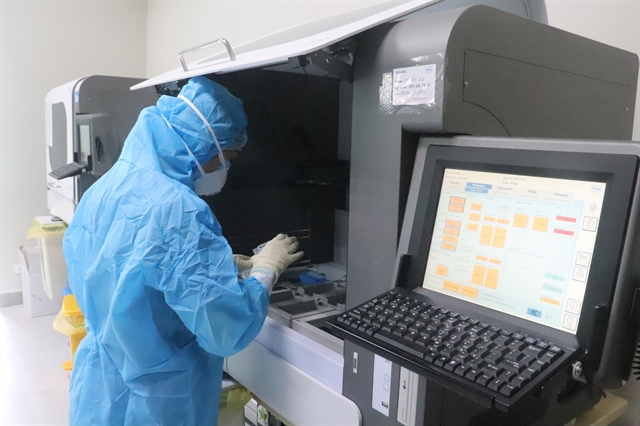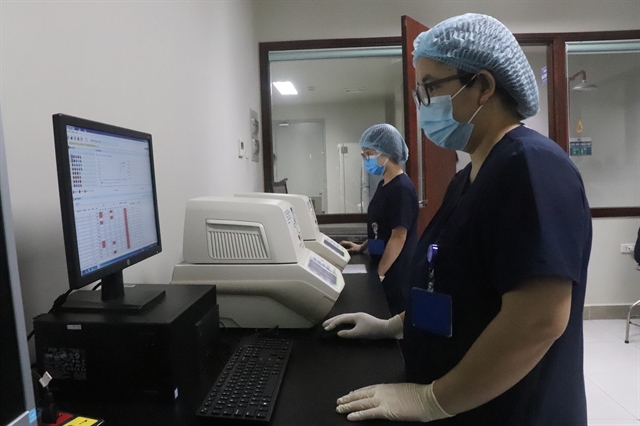 Society
Society


|
| Medical staff from Molecular Biology for Infectious Disease Department under the National Children’s Hospital have worked almost around the clock to test samples. VNS Photos Thái Bình |
Thái Bình and Mai Hiên
HÀ NỘI — Alongside those caring for COVID-19 patients, there are countless people working behind the scenes that are equally important to Viet Nam's battle against the pandemic.
They include the medical staff who are working almost around the clock to test and trace for coronavirus from the National Children’s Hospital (NCH) in Hà Nội.
The hospital is one of four units assigned by the Ministry of Health to conduct real-time polymerase chain reaction (RT-PCR) tests for people returning to Hà Nội from the central city of Đà Nẵng.
Since late July, it is estimated that 72,000 people returned to the capital from Đà Nẵng, a popular tourism destination on the central coast that is the country's COVID-19 epicentre.
City authorities have ordered people who returned from Đà Nẵng July 15-29 to get tested for the novel coronavirus to prevent the spread of the disease.
Phùng Thị Bích Thủy, head of Molecular Biology for Infectious Disease Department under the NCH, said: “As soon as receiving the task from the hospital’s management board to perform 10,000 tests for COVID-19 in two weeks, I sent messages to my staff.”
“All of them asked me for half a day off to take preparation for two weeks as they will be so busy that might not return home. On the morning of the next day, they officially entered the two weeks 'racing against time'," she recalled.
“On the first days, less than 1,000 samples were sent to the department and everyone was excited about the job. We finished the job at 9pm, they could take a rest and rejuvenate for the next day.”
However, in the following days, when the number of samples was up to 2,000 per day, things got more hectic.
“There were days when all 11 of us had to work until midnight,” Thủy said.
“We did not know whether it is day or night because there are so many samples. We can’t leave the work for the next day. We have lunch around 1-2pm and dinner around 7-8pm.”
In addition to performing COVID-19 screening, the departments also had to test between 300-400 samples a day and do emergency screening for all departments of the hospital, she said.
"Those were especially stressful days for all of us. We had never done so many tests like that before," Thủy said.
Trần Minh Điền, deputy director of the National Children’s Hospital, said the hospital was capable of testing 500 samples a day.

|
| Phùng Thị Bích Thủy, head of Molecular Biology for Infectious Disease Department under the National Children’s Hospital, and her staff have worked hard to complete testing for samples of people returning from the central city of Đà Nẵng. |
Taking charge of 10,000 samples in two weeks was beyond the hospital's normal manpower and equipment capacity, so the hospital had mobilised all resources to ensure it could meet the deadline, he said.
Both the machines and people have been working at full capacity over the past two weeks.
The department has three systems able to separate 88 samples in an hour and a half. However, due to a lack of chemicals and machines, they could not keep up with the number of samples being received so decided to work by hand with the volume of the samples halved, she said, adding that by doing so they could separate 96 samples within an hour and a half.
“It is even faster compared to the operation of a machine,” Thuỷ said.
Most of the staff in the laboratory are female. Many of them have suffered from blisters and bloodied their fingers by working on small tubes containing samples. They also face the risk of COVID-19 infection.
Khúc Thị Rềnh Hoa, one of Thủy’s staff, said: “There were days when the number of samples reached its peak, my boss asked us to stop working for fear that we couldn’t stand the work pressure and faint the next day."
Emotional burden
On top of having to work more intensively during the period, Hoa had an emotional burden.
As the workload was growing, the number of calls from her family and children declined, Hoa said.
“My son will enrol in first grade this year. He lives with his grandparents in Hưng Yên Province more often than with his parents since Tết (Lunar New Year).”
“He cries many times as he misses his parents but we can’t do anything but give encouragement, saying his mother is busying fighting the pandemic.”
“I remember that day I received a call from him at midnight once after I just stopped working. He told me he had to wait for a long time to call me before he goes to sleep. Then he asked me when I would come back to pick him up.”
Hoa told her son that she would pick him up after the COVID-19 pandemic ended.
“I miss my son a lot but I have to hold back because I am on duty,” she said.
Hoa said she was still lucky compared with other colleagues because some of them have been separated from their children.
The 11 staff in the department did their best to encourage each other, but still they struggled with fatigue.
“When the number of samples was up to 1,000 a day, we could manage. But when it was up to 2,000 per day, we couldn’t help but feel tired.
“We couldn’t talk or smile. Sometimes we couldn’t eat food because we were too tired," Hoa said.
The tireless dedication of the medical staff paid off as they finished the work on time and more than 10,000 samples were negative for the SARS-CoV2 virus.
Hoa attributed their success in finishing the testing to the encouragement from the hospital’s management board and other staff including those from the IT department and environmental service workers who helped them.
“We all feel happy because if a positive case is found, it is not easy to predict how many samples will increase,” she said, adding that they felt nervous at every result.
When asked whether she was concerned about her safety, Hồ Thị Bích, from Centre for Paediatric Tropical Disease under the NCH, who takes samples of suspected cases, said there were times she worried about getting infected.
However, she always followed safety rules.
“With the encouragement from my colleagues and my family, I always try my best to complete my duties, making a small contribution to the fight against the pandemic of the whole country." — VNS




